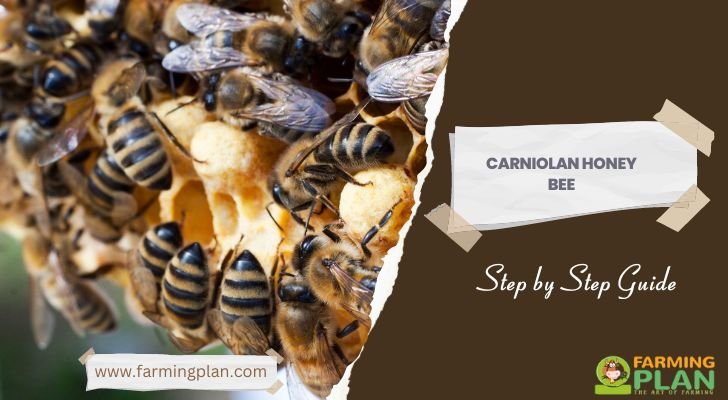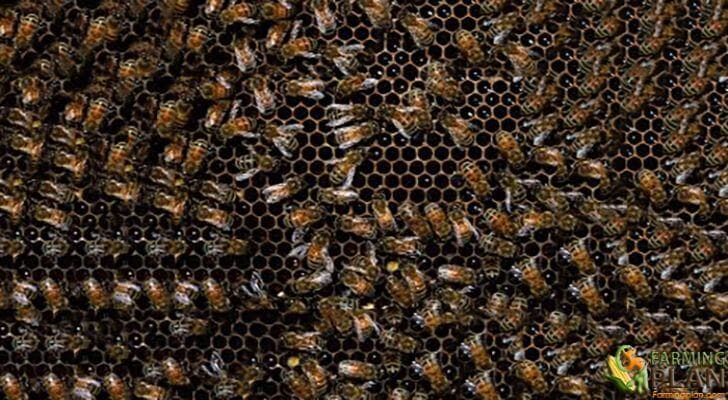Are you considering setting up a Carniolan honey bee farm? If so, you’re in the right place! The Carniolan honey bee is an important subspecies of Western honey bees and are native to Slovenia, Austria and parts of Croatia, Bosna and Herzegovina, Montenegro and Serbia. It’s essential that before you begin your journey into farming this special breed of bee that you understand the fundamentals of their biology, behavior and husbandry. In this blog post we will go through each of these topics step by step to ensure that if you decide on getting started with keeping or raising some Carniolan Honey Bee (Apis mellifera carnica) , then when you do take action it is done so in a safe manner as well as being informed about every aspect entailed into successfully managing such an intriguing little species!

History & Origin
The Carniolan honey bee is a fascinating species that has captured the attention of beekeepers and scientists alike. These bees are known for their gentle nature and excellent honey production abilities, making them a popular choice for beekeeping worldwide. The origin of the Carniolan honey bee can be traced back to the central and southeast regions of Europe. This species has been well-documented throughout history, with mentions in ancient texts dating back to the Roman Empire. Today, Carniolan honey bee are one of the most important honey bee species, providing an important service to ecosystems and agriculture around the globe. Their unique traits and history make them a fascinating subject for Carniolan honey bee enthusiast or student of natural history.
Characteristics
The Carniolan honey bee is an impressive species that boasts a number of unique characteristics. Known for their gentle nature and excellent honey production, these bees are particularly prized by beekeepers worldwide. Unlike other bee species, Carniolan bees exhibit a rapid buildup of their colonies in the spring, which allows them to collect large amounts of pollen and honey during the warmer months of the year. Additionally, their ability to adapt to a variety of environments, even in cold climates, makes them a popular beekeeping choice for many. With their calm temperament and impressive work ethic, the Carniolan honey bee is truly a wonder of the natural world.
Feed
If you’re a beekeeper looking to care for Carniolan honey bee, you’ve come to the right place. These bees are known for their gentle nature and productivity, making them a popular choice amongst apiarists. To properly feed these bees, it’s important to provide them with a food source that’s high in sugar content, such as sugar syrup or fondant. Additionally, it’s important to monitor their food stores regularly to ensure that they don’t run out during times of scarcity. By providing your Carniolan bees with a steady supply of nourishment, you can help to ensure their health and longevity within your hive.
Usage
The Carniolan honey bee is a breed of honey bee that is characterized by its mild temperament, excellent honey production and hardiness. This bee is native to Slovenia and is widely used in Europe and North America due to its adaptability to different climates. Unlike other bee breeds, the Carniolan honey bee is less prone to swarming and is known for its strong maternal instincts. Beekeepers are also quick to point out that these bees have a unique ability to forage even in cooler temperatures, making them a popular choice for early season honey production. Whether you are an experienced beekeeper or a novice, the Carniolan honey bee is definitely worth considering for your next hive.
Special Feature
The Carniolan honey bee, also known as the Carnica bee, is a beloved and sought-after species amongst beekeepers around the world. Originating from the Austrian Alps, this bee is known for its gentle disposition, excellent honey production, and resistance to diseases. It has distinctive grey-black colouration and a calm temperament, which makes it easy to work with. The Carniolan bee is particularly popular in North America for its ability to adapt quickly to different climates and harsh weather. With growing concerns over the population decline of bees worldwide, many are turning to the Carniolan honey bee as a solution to promote biodiversity and sustainable beekeeping practices.
Understand the basics of beekeeping
Beekeeping is a rewarding activity that not only helps increase the bee population, but also provides a sustainable source of honey and other bee products. However, starting as a beginner can be daunting. To begin with, it is essential to obtain the necessary equipment such as a bee suit, smoker, hive tool, and beekeeping gloves. Additionally, beekeepers need to understand best practices for handling bees to avoid upsetting the colony and causing aggression. This includes moving gently, refraining from sudden movements, and avoiding the use of strong perfumes or lotions. Lastly, protecting the bees from pests and predators is vital to ensure their survival and wellbeing, such as using repellants and traps to keep away honey thieves like ants and bears. With these basics in mind, anyone can start a rewarding journey into the fascinating world of beekeeping.
Learn about different hive designs
Carniolan honey bee are famous for their docile nature, high productivity and resistance to diseases. When it comes to choosing a hive design that suits these hardworking bees, you have a wide range of options to consider. Some popular designs include the Langstroth hive, the top-bar hive, the Warre hive, and the Flow hive. Each design comes with its own set of pros and cons, ranging from ease of use and maintenance to capacity and cost. With so many different hive designs to choose from, it’s important to do your research and pick the one that best fits your needs as a beekeeper, as well as the needs of your Carniolan bees.
Selecting Carniolan Queen Bee
Selecting high-quality Carniolan queen bees is essential for any beekeeper who wants a healthy and productive hive. When looking for a supplier to purchase your queen bees, keep in mind that not all bee breeders are created equal. Look for reputable suppliers who have a track record of selling healthy and high-performing queens. When evaluating the queen bees, you should look for traits such as good honey production, gentle temperament, and resilience to diseases. Additionally, ensure that the queen bees were bred from a healthy stock, and that they have been properly mated. With these tips in mind, you’ll be well on your way to selecting the perfect Carniolan queen bee for your hive.
Establishing your apiary
Establishing an apiary can be a rewarding hobby and a great way to contribute to the environment. However, finding the right location for your colony is crucial to its success. Look for a site that is sheltered from strong winds, has access to plenty of sunlight, and is free from potential hazards such as pesticides and predators. Once you have found the perfect spot, it’s time to set up your hive. Start with a sturdy base and make sure your hive components fit securely together. Be sure to provide your bees with plenty of room for expansion, and regularly monitor their health to ensure a thriving colony. With careful planning and attention to detail, you can create a thriving apiary that can provide you with years of enjoyment and a healthy harvest of honey.
Caring for your bees
As a beekeeper, caring for your bees is vital to their survival and overall health. Proper nutrition is essential, and you must ensure that they have access to a variety of nectar and pollen sources. Monitoring your bees regularly can help you catch any potential issues early on and take corrective action. This could include checking for signs of disease or pests, ensuring the queen is producing enough eggs, and making sure the hive has adequate ventilation. Finally, keeping your bees healthy involves maintaining a clean and organized hive, avoiding the use of harmful chemicals or pesticides, and taking steps to protect your colony from extreme weather conditions. By following these guidelines, you can help your bees thrive and continue to support their vital role in our ecosystem.
FAQ
Which is better Italian or Carniolan bees?
The debate over which honey bee is better, Italian or Carniolan bees, has been a topic of heated discussion among beekeepers since the 1890s. While there are clear differences in the way both breeds of bees act and respond to environmental stimuli, neither breed can be definitively labeled as “better”. Ultimately it depends on the individual goals of each apiarist regarding what they need from their bees and what kind of environment they’re operating in.
Are Carniolan bees aggressive?
Carniolan bees are known for their docile and gentle personalities, making them quite popular amongst beekeepers. Despite this characteristic, they can be surprisingly aggressive under certain circumstances; it is important to consider the overall environment when trying to determine why they may be behaving in such a way.
Are Carniolan bees gentle?
Carniolan bees (Apis mellifera carnica) are one of four types of domestic honeybee species found in North America. They are known for their gentle behavior, making them an ideal choice for many beekeepers. Their gentleness is largely attributed to their innate ability to sense the size and strength of a threat they may be facing, and respond accordingly with less aggression than other honeybees.
Conclusion
In conclusion, the Carniolan honey bee is a unique and fascinating subspecies of western honey bee. Native to Slovenia and surrounding countries, it is prized for its hardiness which allows it to thrive in colder climates. With its diverse characteristics, they make excellent sources of honey as well as pollinators. Beekeepers must take special care when managing these bees since they have some unique qualities that require different methods of beekeeping. If you are interested in keeping bees, understand the basics by learning about different hive designs, selecting quality queens, setting up your apiary and caring for your bees. Finally, if you want to bring the sweet taste of Carniolan honey bee into your life, patience and commitment are key – your hard work will surely be rewarded in the end!


